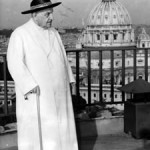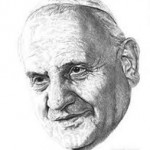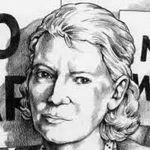‘Great Adventure of the Spirit’
Dorothy Day writes of the final days of Blessed Pope John XXIII fifty years ago...
An excerpt from the Catholic Worker of June-July 1963 - reprinted with permission
Monday, June third, I landed from the Vulcania Italian Line Ship at 45th Street, New York, at eight o’clock in the morning to find many of my friends waiting for me. We had been getting only the most meagre reports as to the Pope’s health on board ship where the news was given out each day in Italian on a tabloid news sheet. Each morning at Mass the chaplain had asked our prayers for the Holy Father, and each afternoon at Benediction we had repeated those prayers.
We were still sitting at our lunch with people coming and going in the little apartment on Kenmare Street, when someone came in with news of Pope John XXIII’s death at three in the afternoon. It had been a long agony and daily I had prayed the Eastern rite prayer for a ‘death without pain’ for this most beloved father to all the world. But I am afraid he left us with the suffering, which is an inevitable part of love, and he left us with fear, too, if the reports of his last words are correct, fear that his children, as he called all of us in the world, were not listening to his cry for pacem in terris.
 He was offering his sufferings, he had said before his death, for the continuing Council in September, and for peace in the world. But he had said, almost cheerfully, that his bags were packed, that he was ready to go, and that after all death was the beginning of a new life. “Life is changed, not taken away”, as the Preface in the Mass for the Dead has it. And just as Thérèse of Lisieux said that she would spend her heaven doing good upon earth, so in his love, John XXIII will be watching over us.
He was offering his sufferings, he had said before his death, for the continuing Council in September, and for peace in the world. But he had said, almost cheerfully, that his bags were packed, that he was ready to go, and that after all death was the beginning of a new life. “Life is changed, not taken away”, as the Preface in the Mass for the Dead has it. And just as Thérèse of Lisieux said that she would spend her heaven doing good upon earth, so in his love, John XXIII will be watching over us.
It was on the day before I sailed for New York, May 22nd, Wednesday, that I had the tremendous privilege of being present at his last public appearance. He stood in his window looking out over the crowd in front of St. Peter’s. An audience had been scheduled as usual for that Wednesday at ten-thirty, and the great Basilica was crowded to the doors when the announcement was made that the Pope had been too ill the night before to make an appearance that day but that he would come to the window and bless the crowd, as he was accustomed to do each Sunday noon.
It was the last time the public saw his face (many of the crowd had opera glasses, so one can use that expression). Questioning those at the little convent where I had been staying in Rome the last week, I learned the subject of the Pope’s last talk, at his last Wednesday audience. He had urged all to read and study his last encyclicals, the call to the Council, Mater et Magistra, and Pacem in Terris. He had said all he had to say, this was the message he left to the world.
“There is an immense task incumbent on all men of good will, namely the task of restoring the relations of the human family in truth, in justice, in love and in freedom; the relations between individual human beings, between citizens and their respective communities; between political communities themselves; between individuals, families, intermediate associations and political communities on the one hand and the world community on the other. This is a most exalted task, for it is the task of bringing about true peace in the order established by God.”
“Admittedly, those who are endeavouring to restore the relations of social life according to the criteria mentioned above, are not many; to them we express our paternal appreciation, and we earnestly invite them to persevere in this work with greater zeal. And we are comforted by the hope that their number will increase especially among those who believe. For it is an imperative of duty, it is a requirement of Love.”
Yes, we will meditate on his words to us all, because he said he was addressing all men of good will, and we will know too, as we have known in the past, how difficult it is to apply these words to individual situations. We need all the gifts of the Holy Spirit, for our work, we need all the help of our guardian angels … And not to know these things, for those of us who do believe, means not to know the treasure we have, the resources we have to draw upon.
I came away from Rome more convinced than ever that the particular vocation of the Catholic Worker is to reach the man in the street, to write about the glorious truths of Christianity, the great adventure of the spirit which can effect so great a transformation in the lives of men if they would consent to the promptings of the Spirit.


 Entries(RSS)
Entries(RSS)